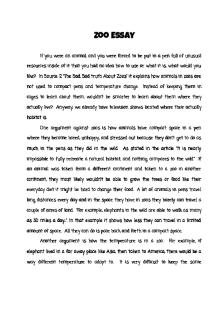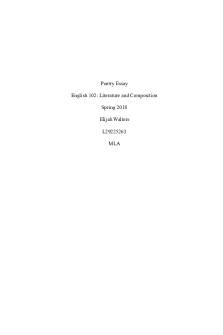Essay \"family as a sociological concept\" - grade B (essay #5) PDF

| Title | Essay \"family as a sociological concept\" - grade B (essay #5) |
|---|---|
| Course | Introduction To Sociology |
| Institution | University of Minnesota, Twin Cities |
| Pages | 5 |
| File Size | 54.4 KB |
| File Type | |
| Total Downloads | 15 |
| Total Views | 147 |
Summary
Family as a Sociological Concept...
Description
Family as a Sociological Concept Colleen Andersen TA: Matthew Aguilar-Champeau
When most people imagine a family, they picture a nuclear family, i.e. one with a father, a mother, and their biological children. However, the sociological definition of a family is vast and largely open to interpretation, ranging from this stereotypical nuclear family to a group of cohabitating people who are in no way related by blood. For the purpose of this paper, I interviewed my father, my mother, and my mom’s older sister (one of five older siblings). I focus on my immediate family for the majority of the paper, but I focus on the maternal side of my family when referring to my extended family (since I have spent much more time with this side of the family and therefore know them better). Some of the topics that I brought up in my interview were whether our family is typical as compared to other families, how my extended family’s history connects to the current culture of our family, and how our family’s values and beliefs have affected the way it works. Consisting of myself, my two biological parents, and my two younger brothers, my family has had experiences which I believe have been very typical of other families. When asked if they thought our family experiences have been typical, both of my parents agreed, based on the fact that we are a nuclear family with a definite set of morals and values. My immediate family currently lives in a small town that is known for being one of the safest cities in our state and having particularly good school systems. We function the way a healthy family should function in terms of parent-child relationships. In a typical day, my dad would work, and my mom would stay home, help us with homework, cook dinner, and clean. My brothers and I grew up playing the sport of our choice and being pushed to do well in school. We knew better than to argue or disrespect our parents, and actions such as this were met with appropriate levels of discipline. These experiences reflect many of the core values held by families across the world, such as respect, togetherness, and mutual support.
Since I was born, my mom has not had a job. My mother, as well as her mom and those of generations before that, firmly adhered to the ideals of “motherhood as a full-time occupation” (Conley 2015:460). This relates to the cult of domesticity, or the idea that a woman’s purpose is to have children and fulfill domestic purposes while their husbands earned money to provide for their families (Conley 2015:461). It was believed that this would benefit not only the woman and her family, but also society as a whole. This theme came about in the early 1900s, and its effects continue to impact family life today. While more women were forced into work in the postWWII era, the wage gap began increasing steadily (Soc 1001 Lecture 7), divorce rates dropped and the birth rates skyrocketed, and women were fully expected to fulfill their role as a “homemaker” before anything else (Conley 2015:461). This trend of women staying home with the children while their husbands work has evolved over the past century and has a much smaller impact on society now than in the past, but in my case and several others, it is still a central part of family culture. While my parents’ morals, values, and traditions stretch back for generations, exterior forces have also impacted my family’s culture. In my first paper on cultures and subcultures, I discussed the U.S. military as a subculture, including its norms and values. Since my immediate family has been a part of this subculture for the past few decades, my parents incorporated these values into their parenting style, and it has therefore become a central part of my family’s culture. Some of the military values that have transferred to my family are a strict parenting style, appreciation for travel, and respect in general. I asked both my parents to what extent they thought the military’s effects have impacted our family. My dad thought that military life has affected our family much more than my mom did. This is likely due to the fact that my dad himself was directly affected by the military, so his perspective was more altered than my mom’s
or their kids’, and the “strict” aspect of the military only reinforced my mother’s preexisting values that were passed onto her by her parents, so the effects are also less apparent in that respect. I asked my parents and my aunt how their values and beliefs have influenced the way their family works, and how individuals in our family have been affected by these values. Both my parents responded that their beliefs were based strongly on their Christian faith – it is what has led them to stay married and raise their children to have similar values. These values include hard work, honesty, and faith. My aunt’s values were very similar – faith, kindness, and integrity. My family’s culture (my parents and my maternal extended family) include typical Christian conservative morals and values. This lifestyle has both benefits and drawbacks. The benefits are the previously mentioned family values: my parents have socialized me to be an honest, hardworking person who shares my family’s values and will pass them onto the next generation of my family. This socialization was also passed from my grandparents to my mother and her siblings, my great grandparents to my grandparents, and so on. Additionally, everyone in my family has very close and healthy relationships with one another. However, some of the major disadvantages to being raised in a conservative household are that my brothers and I were raised very sheltered – I was left clueless about many important but “taboo” topics that I was too afraid to ask about, which impacted me socially and forced me to figure some things out on my own. Additionally I have not felt as though I can be open with my parents about several aspects of my life, which has strained my relationship with them. The reason for this links back to the aforementioned “cult of domesticity” and the gender roles that go along with it. My parents and my extended family do believe in, and adhere to, gender roles in terms of being a stay-at-home mom while the husband works and serves as the
family’s “breadwinner.” Supposedly, this theme has been steadily declining since the original of domesticity (i.e. over the past century) (Soc 1001 Lecture 11), but many families – including mine – still practice it today. This lifestyle, however, does strongly enforce gender roles and incorporate them into a family’s daily life. The way my family functions in this respect is a result of tradition, morals, and culture that has been socialized through the generations rather than through social construction (Soc 1001 Lecture 7), since a large percentage of mothers today do have both a child and a career. In the post-WWII era when my grandmother was raising my mother and her siblings, this may not have been accepted, but today, society has come to accept and adapt to working mothers. As a result of generations of socialization of a specific set of morals and values, my family, as well as many others, still adhere to many values, beliefs, and norms that were followed generations ago despite a consistently modernizing society. The early 20th century’s cult of domesticity and the culture that has evolved from it has had a lasting impact on society, even if it is a no longer a fundamental aspect of family life. My immediate family’s culture includes a combination of these values, the Christian morals and values of my extended family, and the culture of a military lifestyle, which has resulted in a strict parenting style, sheltered children who share many of the same values as our ancestors, and a mother who stays at home and fulfills the role of housewife and homemaker....
Similar Free PDFs

Modern family essay - Grade: B
- 7 Pages

Essay #5 definition - Grade: b+
- 4 Pages

Rogerian Essay - Grade: B
- 2 Pages

Zoo Essay - Grade: B+
- 2 Pages

Causation Essay - Grade: B
- 4 Pages

Final Essay - Grade: B+
- 12 Pages

Propaganda Essay - Grade: b
- 4 Pages

Poetry Essay - Grade: B
- 5 Pages

Galileo Essay - Grade: B+
- 6 Pages

Fiction Essay - Grade: B
- 7 Pages

EPQ Essay - Grade: B+
- 10 Pages

Law essay - Grade: B
- 9 Pages

Persuasive Essay - Grade: B
- 3 Pages

Evicted Essay - Grade: B+
- 3 Pages

Charities essay - Grade: B+
- 13 Pages
Popular Institutions
- Tinajero National High School - Annex
- Politeknik Caltex Riau
- Yokohama City University
- SGT University
- University of Al-Qadisiyah
- Divine Word College of Vigan
- Techniek College Rotterdam
- Universidade de Santiago
- Universiti Teknologi MARA Cawangan Johor Kampus Pasir Gudang
- Poltekkes Kemenkes Yogyakarta
- Baguio City National High School
- Colegio san marcos
- preparatoria uno
- Centro de Bachillerato Tecnológico Industrial y de Servicios No. 107
- Dalian Maritime University
- Quang Trung Secondary School
- Colegio Tecnológico en Informática
- Corporación Regional de Educación Superior
- Grupo CEDVA
- Dar Al Uloom University
- Centro de Estudios Preuniversitarios de la Universidad Nacional de Ingeniería
- 上智大学
- Aakash International School, Nuna Majara
- San Felipe Neri Catholic School
- Kang Chiao International School - New Taipei City
- Misamis Occidental National High School
- Institución Educativa Escuela Normal Juan Ladrilleros
- Kolehiyo ng Pantukan
- Batanes State College
- Instituto Continental
- Sekolah Menengah Kejuruan Kesehatan Kaltara (Tarakan)
- Colegio de La Inmaculada Concepcion - Cebu
